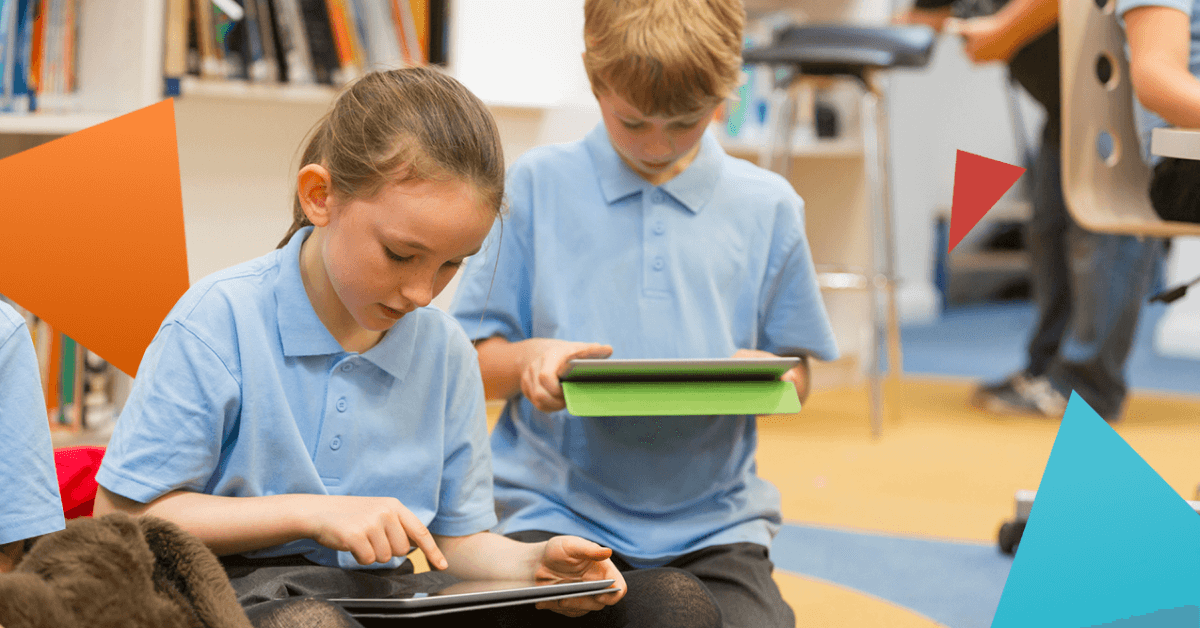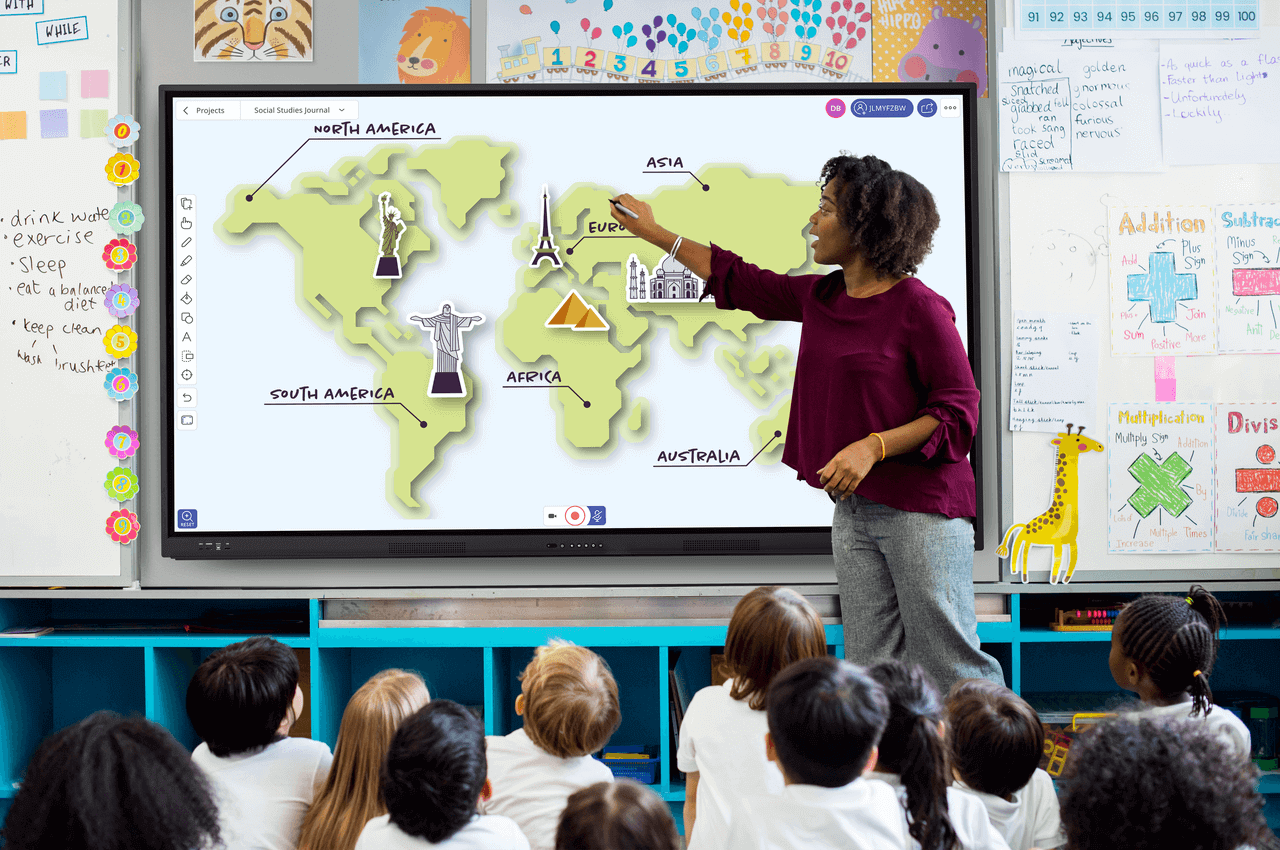Published on October 29th, 2021
Classroom Science Games for Every Age Group
13 minute read

Science is one of the few subjects which will be a constant throughout a child’s school life – from learning the basics about plants and animals in KS1, through to solving complex problems during their GCSEs. Additionally, the skills learnt as part of their scientific education help set students up for success in all aspects of their learning and future careers.
Having students with a solid grasp of scientific concepts can therefore be a huge difference maker for their future and enjoyment of school as a whole. Experiments form a natural part of the subject and these can be combined with interactive display games to further engage students and enhance their understanding.
Discover classroom science games for every age group.
Science games for KS1
During Key Stage 1 your main objective is to introduce children to the basic principles of science and help them learn more about the world around them and begin to think in a scientific way.
As one of the first opportunities children have to discover more about themselves and the world around them while starting to learn vital critical thinking skills, KS1 science forms an incredibly important part of the curriculum. Some people can find it intimidating, however. Solid use of classroom science games will help to make learning science more fun than scary for your students.
Recycling Waste
Learning about the environment is a vital part of KS1 science, and mastering proper recycling to help protect the environment is a large part of that. Recycling Waste helps students master the art of recycling by asking them to make fast decisions on what the correct disposal method is for a huge variety of items. Your students will learn how to make fast decisions and work together to make the right choice while they develop their knowledge of the recycling process.
Galaxy Pugs
Join everyone’s favourite dog on a mission to explore planet Earth in Galaxy Pugs!
This game features a wide array of missions as students are tasked to help the pugs observe Earth’s animals, grow plants, study the human body, experiment with materials, explore our planet’s habitats and find tiny invertebrates hiding in a pond. As students complete missions, they’ll unlock badges and new ways to customise their spaceship.
An engaging, fun game which is always a hit with students, Galaxy Pugs makes learning the basics of science fun.
Pairing for Early Science
Help your students master the scientific vocabulary with this Pairing for Early Science game.
Using a simple drag-and-drop approach, this game asks students to pair vocabulary cards with the relevant images. Audio is provided for all the words and students will be tasked with pairing cards about: the senses, the human body, young animals, animal sounds and animals with wings.
Developing the right vocabulary is so important in KS1 science, this game is a simple, effective way of helping your students do just that.
Science games for KS2
The principal focus of key stage 2 science is to build off the knowledge gained in KS1 and help students broaden their scientific view of the world around them. Empowering students to discuss, test and develop ideas about everyday phenomena and the relationships between living things and different environments helps them to develop the building blocks of scientific thinking.
Earth Squad, Go!
Give your students the opportunity to explore our planet’s habitats playing as Lava, Geo, River or Sky in this game designed to enhance your students’ knowledge of just how varied planet Earth is.
As they work their way through this game, students will explore every kind of habitat, from tropical rainforests to busy cities and the wild savannah. Within each habitat, they’ll use their knowledge on the living world and life within those habitats to advance and boost their score. A great, engaging way for your students to learn about all the different environments which encompass planet Earth.
Junkateers
A perfect way to introduce students to a range of materials and the process of experimentation, Junkateers has students join Jack, Sam and Jo on their mission to clean up planet Earth.
Throughout the game, students will use a variety of equipment including water tanks, furnaces, magnets and the acid test to identify 15 different materials. Your students will need to make predictions, choose the right experiments and record their findings as they master their materials knowledge. After playing this game, students will be familiar with a whole host of scientific concepts.
Make & Test a Wire Loop
Make learning about electricity more fun and involved by asking your students to build their own wire loop game.
Students will learn about conductors, insulators and circuits while they have fun creating their own challenging wire loop game and competing against each other to complete the games.
Science games for KS3
Key Stage 3 is where students’ scientific learning takes significant strides forward in complexity. The topic will be broken down into the three core components of science: chemistry, physics and biology.
Breaking the topic down enables teachers and students to go into much greater detail around each aspect and how it impacts the world around us. You’ll teach students to understand how to use each of these areas and their combined scientific knowledge to explain what is occurring, predict how things will behave and analyse causes. Experimentation and games form a significant part of this.
Middles and Ends
This sequencing activity helps students complete sentences containing scientific facts.
Students can combine their knowledge as part of a group or attempt to untangle the problems alone as you provide them with the start of a sentence and ask them to provide the middle and end.
The linked game is focused on building students’ biology knowledge, but you can create your own cards for other disciplines or even have your class help you by creating their own!
States of Matter Bingo
A scientific version of the classic game designed to help KS3 students reinforce their understanding of vital chemistry vocabulary.
To play, your students take nine keywords from a list of 20 and write them into a grid. Your job as teacher is to then read out the definitions for each keyword in a random order, if the student has the relevant keyword in their grid, they cross it off. As with normal bingo, lines and a full house win the day.
Learning vocabulary is often challenging for students, particularly as it gets more complex in Key Stage 3. This game makes for a fun, competitive way to help students master it.
Friction
A classic building block of KS3 physics is learning about the concept of friction. An easy way to drive home the lessons learned here is to let students observe the effects and experiment for themselves.
In this interactive game, students try to get a car to the end of tracks made of various materials by putting the concepts you’ve taught them about kinetic friction into action. Students can work together in groups to establish just how much it will take to achieve their goal.
Science games for KS4
As you advance to GCSE level, the study of science is focused on developing a deeper understanding of the base concepts students learn in Key Stage 3
As well as being a subject to learn to pass GCSEs,Key Stage 4 science could provide the platform for more advanced study which establishes the basis for a wide variety of potential careers. With the subject getting more complex and pressured, introducing science games to your Key Stage 4 classroom could make a huge difference to the futures of your students.
Rugged Rovers
Help your students explore forces and motion on a deeper level as they attempt to build their own all-terrain space rover.
Featuring a treacherous landscape full of obstacles, students will need to come together to solve a range of practical problems designed to put their scientific knowledge to the test as they look to get the rover as far as it can go.
Hexbusters
Based on the famous television series, Blockbusters, this classroom game asks students to answer questions to complete a path across the grid.
Split your students into teams and test their knowledge with some friendly competition as they look to be the first to get across the board. Use this version to teach students about hormones or create your own to help them improve their understanding of the specific aspect you think your students need help with.
Build a Dome
This simple, fun game helps students improve their understanding of forces and how to properly distribute weight by tasking them with building a self-supporting dome out of straws.
Many structures are built out of straight, rigid frameworks of wood or metal called members, with the forces applied to the members supporting the structure. In this activity, the straws act as members and students use their knowledge of different forces to build their own structure which comfortably supports itself.
Use games to improve your science outcomes with Promethean
Making students an active participant in the learning process through the use of games can only help to improve outcomes. At Promethean, we create world-leading interactive displays, often referred to as interactive whiteboards, designed with the classroom in mind. Alongside this, we offer educational software designed to help teachers get the best-possible results for their students.
Interested in learning more? Get a virtual demo of the Promethean ActivPanel interactive display today.
Click here to view more interactive whiteboard resources.




